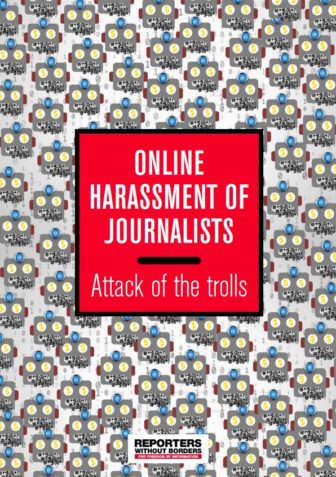العربية | Français | Português |Español
 Editor’s Note: In a new report by Reporters Without Borders (RSF) entitled “Online Harassment of Journalists: Attack of the trolls,” its worldwide network of correspondents in 12 bureaus help shed light on the latest danger for journalists – threats and insults on social networks that are designed to intimidate them into silence. RSF has put forward the following 25 recommendations for governments, international organizations, online platforms, media companies and advertisers to respond to these virulent online campaigns.
Editor’s Note: In a new report by Reporters Without Borders (RSF) entitled “Online Harassment of Journalists: Attack of the trolls,” its worldwide network of correspondents in 12 bureaus help shed light on the latest danger for journalists – threats and insults on social networks that are designed to intimidate them into silence. RSF has put forward the following 25 recommendations for governments, international organizations, online platforms, media companies and advertisers to respond to these virulent online campaigns.
To Governments
1. Strengthen laws authorizing prosecution for online harassment of journalists.
Enforce these laws strictly. Governments must systematically investigate online harassment cases and prosecute and convict their perpetrators. Law enforcement agencies must be granted the human and financial resources necessary to accomplish these goals.
2. Strengthen the responsibility of online platforms in regard to content shared on their networks.
Online platforms must not be given the power to control or censor this content. The system of platform responsibility must be linked to the effects of their activities on the quality of public debate. Governments must likewise strengthen requirements on platforms, especially concerning the transparency of their curation algorithms, as well as the extent to which their moderation policies are consistent with freedom of expression and freedom of information.
3. Implement systems for alert and rapid intervention in harassment cases.
These mechanisms must be coordinated with prosecutorial authorities.
4. Guarantee that the rules for fighting hateful content are applied fairly and consistently.
The rules must not lead to abusive limits on freedom of online freedom of expression and information. Specifically, governments must implement procedures to shield against misuse of these rules and alert mechanisms to censor and silence journalists.
5. Implement recovery procedures for cyberharassment victims.
These could include financial restitution, medical and psychological aid and relocation assistance.
6. Prohibit resorting to online influence and destabilization agents – trolls – in order to manipulate public opinion and harass journalists.
International Level
7. At the United Nations, governments must urge creation of a Special Representative for the Safety of Journalists.
This office would enforce governments’ respect for their obligations.
8. European governments must sign and ratify the Additional Protocol to the Council of Europe’s Convention on Cybercriminality.
State members of the African Union must likewise ratify the Convention on Cybersecurity and Personal Data Protection. State members of other regional multilateral organizations (Organization of American States, Association of Southeast Asian Nations, African Union) must work to create similar conventions.
9. Governments must encourage multidisciplinary international research on censorship techniques.
These practices change constantly. Research must focus on operating methods and on responses to cyber-harassment in general and on cyberharassment of journalists in particular.
Education
10. Governments must strengthen digital education.
The aim is to increase internet users’ awareness of the impact of online harassment, and the legal consequences for perpetrators.
11. All public policies concerning online violence must take into account its gender-specific nature.
Women journalists are the major targets.
To International Organizations
12. Continue to urge governments to uphold the principle that “the same rights that people have offline must also be protected online, in particular freedom of expression.”
13. Contribute to research on methods of online harassment.
Organizations must help finance this research and make recommendations to governments on fighting cyberharassment.
14. International and regional human rights protective systems must include online harassment in their monitoring of abuses against journalists.
To Online Platforms
15. Online platforms must be transparent concerning their rules for moderating online content.
They must strengthen the public nature and the transparency of their actions against online harassment. And they must establish alert systems focused on hate content.
16. They must ensure that these rules are not turned into methods to silence journalists.
All alerts concerning potentially illicit content must be subject to careful analysis. The platforms must be able to distinguish abusive alerts, designed solely to muffle upsetting opinions, from alerts over genuinely abusive content.
17. Establish a victim-centred emergency alert system for journalists who are targeted by online threats and attacks.
18. Cooperative actively with law enforcement authorities in investigations of cyberviolence against journalists, with measures including public release of the perpetrators’ names.
19. Combat online harassment campaigns that are orchestrated by troll factories or bots.
20. Develop communication and awareness campaigns concerning online violence, with special attention to the targeting of journalists, especially women.
To Media Organizations
21. Acknowledge the threat and learn to anticipate attacks.
The media must strengthen the awareness of owners, executives and journalists, and implement emergency internal mechanisms such as cyber-harassment hotlines to assure support and protection of journalists hit by harassment.
22. Encourage the creation of networks to exchange best practices by developing a holistic approach.
Those involved should include editors, community managers, digital security and legal executives as well as journalists within a media organization, but also from other media organizations, including those from abroad and even from other industries.
23. Make online harassment of journalists a major issue.
Devote more reporting and investigating to a topic that is not well known, thereby informing and building awareness in the public at large, and among government officials and journalists themselves.
To Advertisers
24. Refuse to advertise on sites that participate in dissemination of hate content.
And shun sites that do not do enough to fight cyber-violence.
25. Develop ethics codes and best practices for online advertising.
This work should be done in cooperation with civil society organizations, in order to ensure that online advertising does not help finance online harassment.
This excerpt is taken from this Reporters Without Borders’ report and is republished here with permission.
Based in Paris, Reporters Without Borders (RSF) is an independent NGO with consultative status with the United Nations, UNESCO, the Council of Europe and the International Organization of the Francophonie, Founded by four journalists in the southern French city Montpellier in 1985, RSF is now one of the world’s leading NGOs in the defense and promotion of freedom of information.


